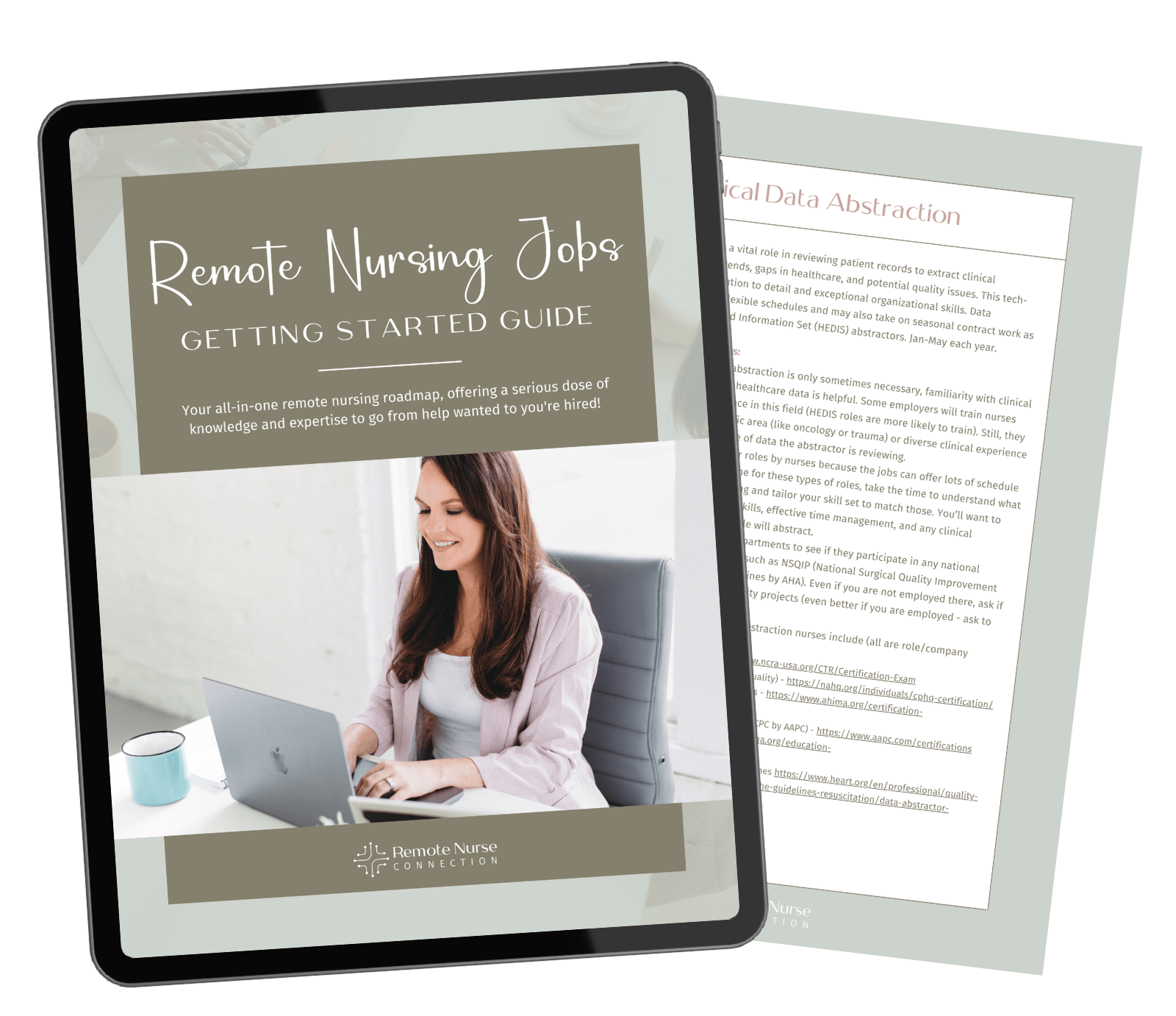
Why am I not getting interviews for remote nursing jobs?
“I’ve been sending out application after application for remote nursing jobs, only to be met with either crickets or the dreaded email that sounds something like, ‘We’ve reviewed your application and decided to go with more qualified applicants.‘” Does this sound familiar? If so, you’re not alone, and you’re in the right place to start evaluating your application strategy for these remote nursing jobs. Applying to these types of nursing jobs is not the typical experience nurses have had in the past when applying to bedside jobs.
You know you’re qualified for the job, but you just can’t seem to get someone to call you for an interview! Jumping right in once you’ve decided to pivot away from the bedside seems like the next logical step, but these remote nursing jobs require a different kind of resume and application strategy to land interviews. It’s incredibly frustrating when you’re putting application after application but not getting call backs for interviews. Doing some prep work before applying will get you ahead of the competition when you start submitting resumes.
If you’re wondering how to get a remote nursing job but keep facing rejections, it’s time to take a step back and reevaluate your approach. In this post, I’ll walk you through some critical questions that can help uncover some common reasons why you might not be making it past the application stage. From resume tweaks to optimizing your LinkedIn profile, we’ll look at ways to improve your chances of landing that interview and getting noticed by recruiters.
What types of remote nursing job roles are you targeting? Do you have draft resumes written for them?
The traditional “one resume” application approach could be one reason you aren’t landing interviews. Having draft resumes tailored to specific skills for the different types of remote nursing jobs will save you time and make it easier to customize each resume for individual job postings. While it’s fine to target multiple roles, it’s important to understand which positions share similar skill sets. This way, you can have drafts focused on those skill groups, streamlining your resume adjustments to effectively show off the right skill set for a particular job.
The biggest mistake I see is nurses applying to multiple different types of jobs with the same generic resume—a strategy that often leads to more rejections than interviews. Recruiters and hiring managers want to know why/how your skills are a perfect fit for their specific job. Since applying to these jobs quickly is another factor to consider, spend some time drafting a resume for each type of remote nursing role you are interested in applying to.
When reviewing the job description, focus on understanding what the minimum vs preferred requirements are, as well as what types of transferable skills the employer is seeking. Remember, it isn’t just about your total years of nursing experience. Ideally, you want to make sure you meet the minimum requirements to apply (occasionally there’s leeway if you have meet some of the preferred requirements). If you’re unsure what types of remote nursing roles are out there or the common skills they require, check out the list in the Remote Nursing Jobs Getting Started Guide.
Have you researched the starting market salary for the role based on specific company and location?
Just entering what you are currently making at the bedside is not market research & could be a HUGE reason you are getting rejected (preset ATS screening question). If salary is a top priority for you, it’s essential to focus on roles that align with your financial goals by doing market salary research for the role, company, and location. One of the common reasons nurses face rejections for remote nursing roles is due to mismatches between their current experienced bedside salaries and the entry-level salaries offered for remote nursing roles that require training. Salaries for remote jobs are also frequently location-based, so understanding the market rate for your area is key. If maintaining a higher salary is crucial, focus on hospitals and companies in your state (or states with similar cost of living & market salary), as they’re more likely to offer pay rates that align with what you’re currently earning.
It may also be worth exploring onsite or hybrid roles as a stepping-stone to remote positions. Gaining specific experience for one of these remote nursing roles will make you more competitive and give you leverage to negotiate a higher salary once you’re ready to transition fully to remote work.
Breaking Into Case Management or Utilization Review?
Most nurses hit a catch-22: employers want MCG/InterQual certification, but you need a job to get trained. Case Management Institute (CMI) solved this problem.
They’re the ONLY organization partnered with MCG Health that lets you get certified before landing the job. After completing their Utilization Management & MCG course, you’ll be eligible to take the MCG Certification Exam, no employer sponsorship needed. Plus, their courses are accredited for nursing continuing education hours.
Ready to break the cycle? Use code ANDREA10 for 10% off your CMI courses.
What is your average resume ATS match % score before applying?
By now, you’ve probably heard about ATS (Applicant Tracking System) and that you should include keywords from the job description on your resume. But you shouldn’t just stuff these keywords anywhere (and never try the “trick” of “hiding” them – very bad advice!); you should always work these keywords and phrases that align with your skills into your resume naturally.
Basically, you want to show that you are the best candidate for the job by using the language of the job description to describe your skills and work experience history. There are so many tools available now to help you pick out the relevant keywords and phrases from the job description so that you can showcase your skills effectively on your resume. You can do this process manually if you understand how to recognize what the target key skills are, but if you are new to this process, give one of the ATS scanners a try! There are several options linked in the free getting started guide. My personal favs are Jobscan, Skillsyncer, & Teal HQ.
Are You Confident in Your Responses to ATS Screening Questions? aka Knock-Out Questions
Screening questions are another crucial factor why many applications are rejected. These questions often cover key areas such as your experience, licenses, or the salary you’re seeking. If your answers don’t meet the company’s criteria – especially for minimum experience or licensure – your application could be automatically rejected.
But it’s not just about experience or salary. Companies frequently use these screening questions to filter out candidates who don’t meet state licensing requirements, are unavailable for specific work schedules, or don’t have the specific nursing experience they are looking for. These knock-out questions could be the reason your application never makes it to a hiring manager.
Take the time to thoroughly review the job description and understand what the company is looking for. If you find yourself not meeting every qualification but still feel you’re a great fit for the role, reach out to a recruiter to explain your experience and see if there’s any flexibility. Use screening questions as an opportunity to think through your experience and how it directly relates to the job you are applying to, rather than just ticking boxes.
For more information about ATS screening questions and how to recognize them, check out this blog post.

Have you researched companies? Are there any you are applying frequently to?
Research companies that offer the types of roles you are interested in (all remote roles are not created equal for every nurse/personality type!). Check out this post to learn about roles for introverted nurses. Save the company careers page on your browser favorites to quickly check their job board daily & set up job alerts if they have the option to.
Pick a day during the week when you have time to apply to a few jobs that have just been posted: hot, off-the-press jobs! Applying early is one part of the equation of getting your resume at the front of the line for an interview (remember this is just one part of many). Some companies will show you the date the job was posted on their careers page; others won’t, unfortunately. You can also sort the jobs by date posted on some sites & use Indeed or LinkedIn to find recently posted jobs. Another tip to save you some time: companies often reuse the same job description templates, so once you’ve optimized your resume for a specific job title at a company, save it so you can quickly rescan it (ATS Scanner) when a new job (same job title/role) posts again, check for any tweaks that need to be made to tailor your resume, and then quickly apply to that newly posted job. It’s not uncommon for nurses to submit multiple applications to the same company, so don’t be afraid to keep applying!
What remote nursing role is your LinkedIn profile account optimized for?
If you’re not using LinkedIn effectively in your remote nursing job search in 2024, you’re missing out on a huge opportunity to connect with recruiters. Having a generic LinkedIn profile that only lists basic bedside clinical skills or trying to include unrelated skills for drastically different roles means you’re not using the platform to its full potential. While casting a “wide net” of skills on your LinkedIn profile might seem like a smart way to increase your chances of landing interviews for various remote roles, it can actually make it harder for recruiters to find you. Recruiters typically search for candidates with specific skills tailored to the role they’re hiring for, and simply listing “Remote Nursing” won’t be targeted enough to appear in their search. Check out the remote nursing jobs LinkedIn profile optimization tips in the free getting started guide.
What is your process for following up after applying?
If your answer is, “I apply and wait to hear back,” you’re missing out on opportunities to stand out from other applicants! This traditional method might work eventually, but nurses who actively follow up and seek out networking opportunities tend to land interviews faster. After submitting an application, consider sending a polite follow-up message to the recruiter or hiring manager. Express your continued interest in the role and briefly showcase how your skills align with their needs. Remember, it’s not just about years of nursing experience, but effectively showing what transferable skills you bring to the table for this new job you are applying to.
Yes, there will be times when your email or message goes unanswered—and that’s okay! But there will also be times when your message is noticed, leading to an interview or even a referral to another job opportunity. Now, you’ve just created a lasting connection in your job search! If you’re not sure what to say, there are email and LinkedIn messaging templates available inside the membership to help you get started.
In addition to direct follow-up, use LinkedIn to connect with recruiters or employees at the company. Engage with their content, comment on posts, or send personalized connection requests. Building these relationships can help keep you top of mind when they’re reviewing candidates. Remember, sometimes a simple follow-up or networking effort can make all the difference in getting noticed & standing out from other nurses.
Final Thoughts
If you’re still facing rejections despite effectively tailoring your resume, following these tips, and staying diligent, it’s important not to lose hope or give up! Making a career pivot away from bedside nursing to a new remote nursing role is often a lengthy process since the competition is so high. Continue refining your approach, learning from each rejection, networking, and you’ll eventually start landing interviews! The key is persistence and ensuring that you’re effectively marketing yourself as the best fit for the job at every step of the process.
If you’re looking for resources to save you time in your job search, then you’ll love the Remote Nurse Connection Premium Membership! Inside, you’ll get resume examples, a roadmap strategy for applying to remote nursing jobs, access to our community for feedback and support, and soooo much more! No more posting questions in FB groups; waiting and hoping to get it answered! If you’re not ready for the full membership but need a quick bedside resume refresh, check out this $9 Guide!
Remote Nurse Connection is proudly Ad-free. All opinions are my own. This post may contain affiliate links, which means I’ll receive a commission if you purchase through my link, at no extra cost to you. As an Amazon Associate, I earn from qualifying purchases. Please read full disclosure here.
Browse A Bit More On the Blog…
Ultimate Guide to an ATS-Friendly Remote Nurse Resume Template
Feb 28, 2025
Table of Contents Why Your Resume Needs a Makeover for Remote Nursing Jobs What is Applicant Tracking System (ATS)? Key Components of an ATS-Friendly Remote Nurse Resume Free ATS Resume Templates for Remote Nurses Final Thoughts - Expert Guidance Why Your Resume Needs...
The Best PRN & Part-Time Work from Home Nursing Jobs
Feb 7, 2025
PRN and part-time work from home nursing jobs? Yes, they exist! But they’re not as easy to snag as landing traditional PRN bedside nursing jobs. Whether you're a Registered Nurse (RN), Licensed Practical or Vocational Nurse (LPN/LVN), or Nurse Practitioner (NP),...

Your Insider Connection to Remote Nursing Success
I help nurses find the best-fit remote jobs that bring flexibility, personal freedom and alignment, and continued professional growth.
CATEGORIES

Free Getting Started Guide
FOR LANDING A
REMOTE NURSING POSITION!


